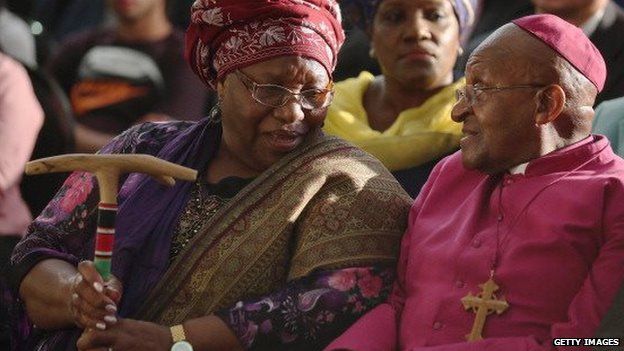South Africa’s Archbishop Desmond Tutu and his wife have laid criminal charges against one of their granddaughters.
Ziyanda Palesa Tutu, 30, has tweeted that she will be handing herself in.
Police in Cape Town confirmed they were investigating “malicious damage to property” in relation to the case.
“We are naturally distressed and deeply saddened,” a statement from the Nobel peace laureate’s foundation said, adding that the family hoped to soon put the incident behind them.
Ms Tutu, who is not a regular tweeter, said on the social platform on Tuesday morning: “We are waging war. Truths will be revealed.”
More than 12 hours later she posted: “I am regrouping but @TheDesmondTutu & granny Leah I will be handing myself in on Friday. # TututrialbyMedia.”
The 83-year-old retired archbishop and his wife Leah then issued a statement on Thursday saying: “We confirm that a criminal charge has been laid and that police are conducting an investigation.”

Desmond Tutu:

- Born 1931
- 1970s: Became prominent as apartheid critic
- 1984: Awarded Nobel Peace Prize
- 1986: First black Archbishop of Cape Town
- 1995: Appointed head of Truth and Reconciliation Commission
- Strong critic of South Africa’s ANC, Zimbabwe’s Robert Mugabe, Israel’s policy against Palestinians and US-led war in Iraq
- Supports assisted dying for the terminally ill
According to the Associated Press news agency, police said the case was opened last week, and indicated that it was Leah Tutu who filed the complaint.
“This office can confirm that a malicious damage to property case was opened for investigation by the complainant against her granddaughter,” it quoted police from the Western Cape province as saying.
Ms Tutu, who describes herself as “Desmond Tutu’s first grandchild” and a qualified wine judge on her Twitter profile, posted on Thursday that she was too emotional to give interviews but would talk when she was ready.
Her grandfather played an instrumental role in the struggle against apartheid, winning the Nobel Peace Prize in 1984 for his efforts.
Reaction: BBC Africa’s Milton Nkosi, Johannesburg
The news of Ziyanda Palesa Tutu’s brush with the law came as a surprise to most South Africans. She is not a well-known figure here but it shows that no-one is above the law even if they come from a prominent family. The reaction on social media sites has been subdued.
I have met Desmond Tutu a few times and I know that this will be devastatingly painful for him and his wife Leah.
The archbishop was appointed by Nelson Mandela, whose family also had acrimonious disagreements in public, to chair the Truth and Reconciliation Commission in the mid-1990s.
More than anybody else, the archbishop knows that he will have to lead by example once the dust has settled in this family dispute – as he has in the past.
The statesman is affectionately known at “the Arch” by South Africans and garners worldwide respect for his outspoken views.
Two years ago he stepped down as the chair of the Elders – a group of former leaders who help resolve global disputes, but he still makes public appearances around the world.






























